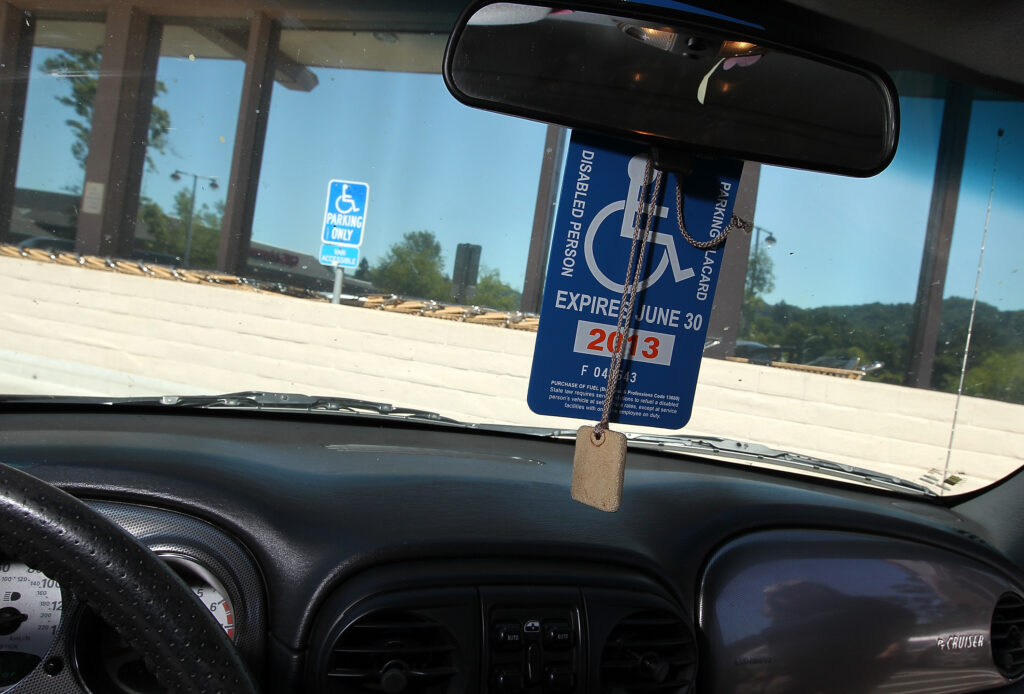The conservative movement pushing for more U.S. births and bigger families has a new target for its vision: parking lots.
Lawmakers, largely in red states, want to allow pregnant women to use parking spots set aside for disabled people under federal law, regardless of medical necessity. That has drawn opposition from disability advocates, who say the measures violate the Americans With Disabilities Act and allow people without disabilities to use special spaces that are already scarce.
It’s a “math problem,” said Olivia Keller, 48, a wheelchair user who lives in Tallahassee. Florida lawmakers enacted a pregnancy parking law in July that allows any pregnant woman to get a one-year accessible parking permit.
“If you’re not adding more spaces and you’re adding more people, obviously you are taking it away from the people who need to park there,” said Keller, a public policy manager and disability advocate.
She sued last month, seeking to overturn Florida’s law in what is likely the first legal challenge to such policies. Ohio’s legislature is considering its own version this month that is modeled after a law enacted years ago in Illinois. Republican lawmakers in Arizona and South Carolina are crafting similar policies, and their colleagues in states like Arkansas are preparing to reintroduce measures on the matter.
Patrick T. Brown, a fellow at the Ethics and Public Policy Center, a conservative think tank, helped design the new slate of parking bills. He pitched them as a low-cost way to implement pro-family policy without going through Congress.
“It is a high visibility way of saying we are serious about our commitments to family and moms and babies,” Brown said. He’s skeptical of arguments that expanding the special spots to pregnant women would crowd out users with disabilities.
Brown laid out the parking plan in a July blog post published by another conservative think tank, the Institute for Family Studies.
He got the idea after going for lunch with his wife, Jessica, and four children, the youngest of whom is 2 years old. It was a hot summer day, and at first, only the disabled spots up front were open, Brown said.
His wife half-jokingly asked him to write about a world where new moms could use those spaces, he said.
The familiar blue-painted accessible parking spots seen across the country became federally mandated after Congress enacted the Americans With Disabilities Act in 1990.
The law defines a disabled person as someone who “has a physical or mental impairment that substantially limits one or more major life activities.” Pregnancy does not automatically fall into that category, but some pregnancy-related complications are eligible for accommodations, including accessible parking.
For example, in some states, if a pregnant woman cannot walk 200 feet without stopping to rest, she can get a doctor’s note and apply for a temporary permit to use accessible parking spots, which are larger and often located closest to a building.
The minimum number of accessible parking spaces required by federal law varies by facility and lot size. Generally, they make up about 4 percent of the spaces in lots that hold up to 150 cars and 2 percent of the spots in larger lots. Accessible parking spots for cars and vans are required to have access aisles.
Keller, who was born without arms and has nerve damage from a knee replacement 20 years ago, uses the spaces and their access aisles every time she goes somewhere.
Access aisles allow her to extend a ramp from her specially equipped minivan so she can enter and exit in her wheelchair. On the vehicle’s passenger side, a sticker instructs other drivers to leave at least an eight-foot gap from the door, the clearance required for the ramp.
“They’re not there for convenience,” she said of the accessible spaces. “They’re there for need.”
But proponents of allowing pregnant women to use the spaces argue they deserve access to them for temporary reprieve during a physically grueling time.
In 2022, Illinois began allowing any pregnant woman in her third trimester to park in those spots for 90 days.
The measure sailed through the state’s House and Senate with bipartisan sponsors and unanimous votes in favor. Its main sponsor, Republican state Rep. Keith Wheeler, called it a “small, but worthwhile initiative” for moms-to-be, especially those in their third trimester during the state’s harsh, snowy winters.
In Florida, it was heat that drove the discussion. State Rep. Fiona McFarland (R), told her fellow lawmakers during a March committee meeting that one day while nine months pregnant, she “sweat and waddled across a parking lot” in the Florida sun while disability parking spots were all vacant — a moment that motivated her to introduce the parking provision.
A colleague, concerned that the text implied that pregnant women were disabled, asked McFarland, a mother of three, whether her bill would carve out new parking spots and permits dedicated to expectant mothers.
It wouldn’t, McFarland explained.
“I feel very strongly that pregnancy is not a disability. I just want to be able to park up front,” McFarland concluded, to a chorus of laughter. McFarland’s office did not immediately respond to a request for comment.
To Keller, the remarks were insulting. She listened to them as she researched the law after first hearing about it at an August work meeting.
Keller started getting calls at her job from disabled people who said they felt like suddenly they couldn’t find a parking spot when they went to the grocery store. As she scrolled social media, she saw photos from pregnant women holding up a disability parking placard, encouraging other expecting mothers to get one.
Keller decided to tee up a legal fight.
On Oct. 27, she filed a federal lawsuit against the Florida Department of Highway Safety and Motor Vehicles and its executive director.
The agency did not respond to a request for comment from The Washington Post.
Elsewhere, disability advocates are now trying to stop similar measures.
“After Florida, our guard went up,” said Steve Lieberman, senior director of advocacy and policy for the United Spinal Association.
This month, Lieberman testified against Ohio’s parking measure, which would allow pregnant women to apply for access to disability parking spots for up to one year. The bill is in committee, where lawmakers will look to amend it to increase enforcement of disability parking rules — a change the sponsors hope will allay advocates’ concerns about availability.
“We’re doing something to make sure that when we say we’re pro-life, we really do care for mom before and after the baby is born,” said Ohio state Rep. Adam Mathews, a Republican who sponsored the bill.
The efforts from Mathews, who has five children, reflect the buy-in that Brown, the Ethics and Public Policy Center fellow, has gotten from conservative lawmakers. Mathews personally called on a counterpart in Kentucky to introduce a similar measure.
For Keller, the issue is not that the policy is designed to help families. She opposes it because she sees it as taking a lifeline away from her and others with disabilities.
If she didn’t have an accessible parking space, she would not be able to drive to the Florida Capitol for her policy work. She might not have gone on her first date 11 years ago with the man who is now her husband.
Accessible spaces aren’t “to make my life easier,” she said.
“It’s to make my life possible.”
The post Conservatives want to allow pregnant women to park in disabled spaces
appeared first on Washington Post.




